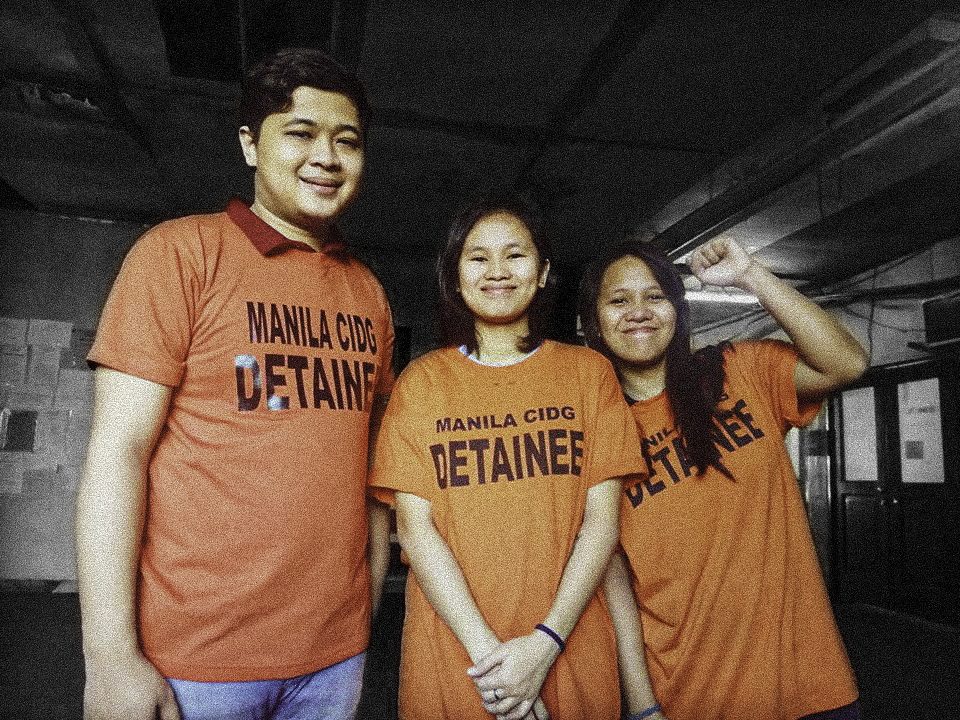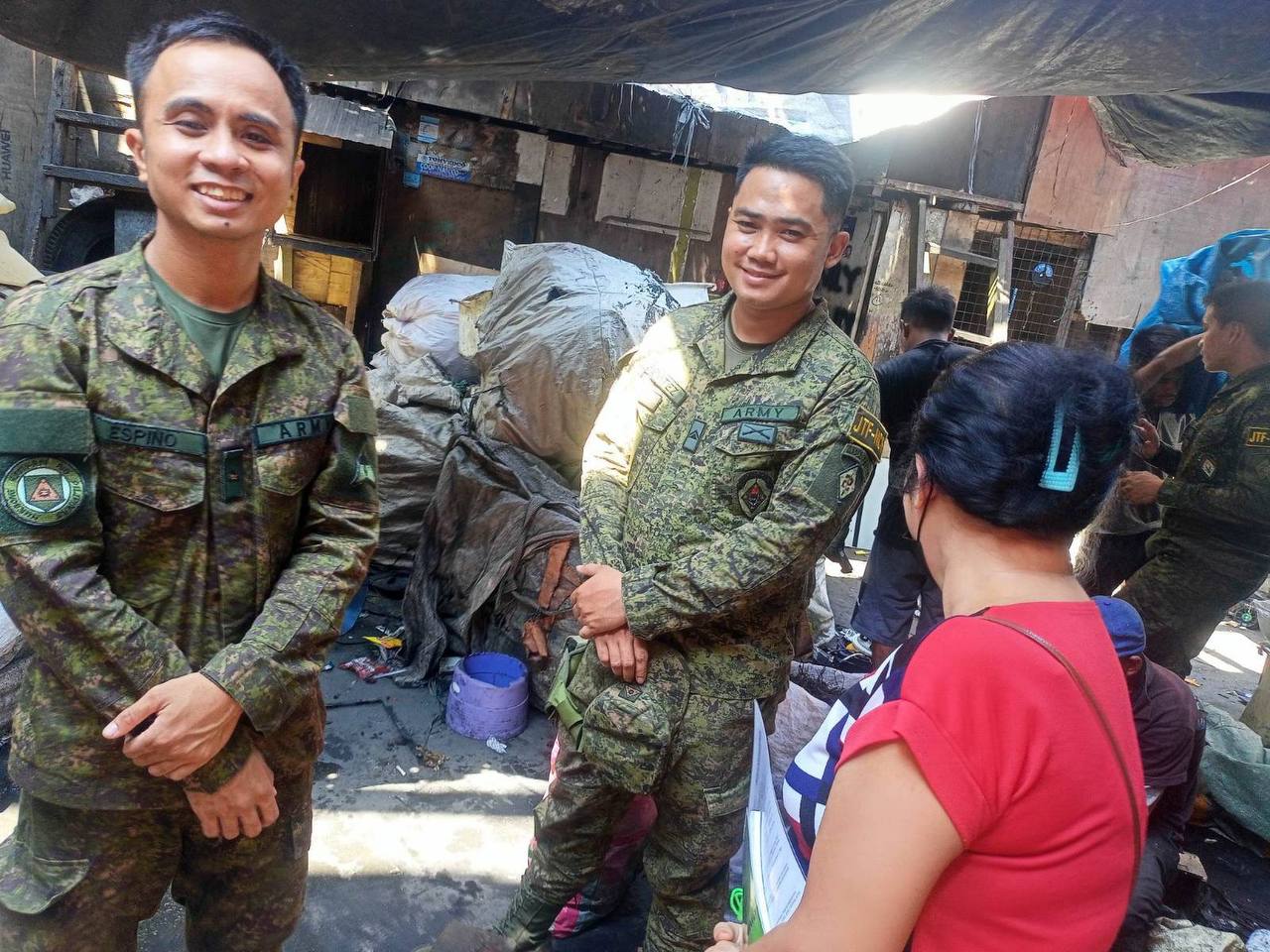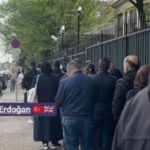Despite the president’s pronouncements to shift focus from internal to external threats in 2023, the troops deployed in Metro Manila are increasing their numbers and widening their reach in the region.
11th CMO deployed in Metro Manila
By March 2023, the Philippine Army had deployed troops in Metro Manila from the 11th Civil Military Operations (CMO) “Kaugnayan.” Their mission is to “deradicalize and address the insurgency problem in the National Capital Region and Luzon in general.”
In 2023, the Kaugnayan Batallion made its rounds in the urban poor communities of Manila, Quezon City, Caloocan, and Malabon. They also joined the peace and order councils of the Manila, Caloocan, and Malabon local government units, heading the committee on anti-insurgency and preventing violent extremism.
In April and May this year, the head of the 11th CMO made courtesy visits to the Mandaluyong Police Office and Eastern Police District (EPD) chiefs. The EPD’s jurisdiction includes the cities of Mandaluyong, Marikina, Pasig, and San Juan.
Following the onslaught of typhoon Carina and the monsoon rains on July 24, the 11th CMO held outreach activities in the cities of Marikina, Malabon, Mandaluyong, and Manila.



12th CMO from Marawi deployed in Manila
From Lanao del Sur, the 12th CMO “Kapatiran” Batallion was also deployed in Manila in 2023. Four of their platoons of the battalion were now stationed in Sta. Mesa, Ermita, Sta. Cruz, and Tondo.
In March, Manila Today was able to speak with the team leader of the soldiers from the 12th CMO deployed in Brgy. 98, Tondo, Manila. Julem Nabua said their activities in the community consisted mainly of security and peace and order assistance. He declined to answer more questions.
“I didn’t quite understand when the military said they would be deployed here. For what? They said they were looking for something or someone. They said it was confidential. I allowed them here, but I don’t know why they chose us because my barangay is small. I did not ask. They said they were monitoring the drivers, the leftists, Gabriela,” said Chairwoman Julie Bernardo of Brgy. 98 in an interview with Manila Today.
She said residents asked about the military in their barangay. There were many reports that residents were afraid. She told the military about this. The soldiers questioned why the people would be afraid of them when they were there to help.
The chairwoman said that one positive aspect of the military’s presence is that it deters noise and rowdy drinking in the community. People were afraid to misbehave.
“But I hope [the military] can clear up what they want to happen in our community. And for how long do they intend to stay? My constituents are asking me about this, and I don’t have the answer. They’re asking why the soldiers have been here for a year,” said the chairwoman.
More troops in Metro Manila
On May 21, the 11th CMO posted on their Facebook page the send-off for one of their platoons for deployment in the NCR.
Just two months before, the military adopted the Comprehensive Archipelagic Defense Concept. Defense Secretary Gilberto Teodoro Jr. said this is a strategic action for developing the military’s capability to protect and secure the country’s entire territory and Exclusive Economic Zone. He said this was in line with the president’s directive for the armed forces to focus on external defense.
With this shift of focus and the rising tensions in the West Philippine Sea, Lory asked, “So why are the soldiers still in Metro Manila?”
Marcos Jr. said last year that the communist insurgency threat is at an end and that the military must “continue being the catalyst to the surrender and disarmament.”
“So the government considers the internal threat still not over. This appears to be the impetus for continued military deployments in Metro Manila. But why deploy troops to face unarmed civilians? Are we the enemy?” asked Lorevie Caalaman, or Lory, of rights group Karapatan NCR.
Counter-insurgency efforts in Metro Manila
After ardent statements about pursuing the peace process with the Communist Party of the Philippines (CPP), former president Rodrigo Duterte dropped the peace talks and issued Executive Order 70 in 2018. This institutionalized the whole-of-nation approach to the government’s insurgency problem and formed the NTF-ELCAC.
One of the premises for pursuing this approach to peace and security in the country is the Joint Communique of the 50th ASEAN Foreign Ministers Meeting in Manila in August 2017. The importance and effectiveness of the whole-of-nation approach as opposed to a purely military option in combating terrorism and violent extremism were reaffirmed. This, in turn, followed the whole-of-government approach in the 2009 US Counterinsurgency Guide.
In achieving inclusive and sustainable peace, the Philippine government stated it would prioritize and harmonize the delivery of basic services and social development packages in conflict-affected areas and vulnerable communities.
However, the NTF-ELCAC has been more well-known for red-tagging government critics.
Calls from various sectors to abolish the NTF-ELCAC have been replete, following the agency spokespersons’ incessant red-tagging of activists, journalists, lawyers, health professionals, church people, artists, teachers, youth groups, and even politicians and celebrities. It came to a point where anyone who spoke against any government program, action, or pronouncement ran the risk of being red-tagged by state forces.
“When the government said they would use a whole-of-nation approach, it now appears that they are not only going after fighters with guns but also activists with placards,” said Lory.

Meanwhile, the government continues to deny engaging in red-tagging. Various military officers and security officials said they were “truth-tagging” when they linked civilians and critics to the CPP or NPA.
“Even a court in Manila ruled against proscribing the CPP as terrorists. The government and the military insist on calling them terrorists. So when they red-tag critics and activists, it is also like telling us that terrorism for them is as simple as a citizen having a contrary thought,” said Lory.
In 2019, Lory was the subject of vilification efforts by groups organized by the NTF-ELCAC. The sticky part was that NTF-ELCAC organized the mothers of activists and made to campaign against youth activist groups. The group presented Lory as a minor who went missing, kidnapped, and brainwashed by the Kabataan Partylist. Lory dispelled the claims. She continued her advocacy work and later became part of Karapatan NCR.
Red-tagging became a prelude to threats, arrests, or killings
For years, the practice of red-tagging went unbridled despite the real physical threats and risks it presents to victims of red-tagging. State forces, usually NTF-ELCAC spokespersons, invoke their right to expression when accused of red-tagging.
A proposed bill in the Senate in 2021 attempted to provide a legal definition for red-tagging and criminalize red-tagging. Congress did not pass this legislation or any other bill against red-tagging.
In Metro Manila, red-tagging preceded several arrests of activists.
“When the red-tagging happened after the arrests or killings, it was meant to justify them. This is similar to how drug war killings were accounted for as suspects having ‘fought back’ or ‘nanlaban’,” observed Lory.
After the JTF-NCR was formed in 2019, several pre-dawn police raids through search warrants issued by former Quezon City Executive Judge Cecilyn Burgos Villavert led to the arrests of activists in Metro Manila from 2019 to 2020.
Police alleged finding firearms and explosives during these arrests and filed non-bailable cases of illegal possession against the activists. Most of these cases have been dismissed or the warrants have been quashed by now, allowing most of those detained in this series of arrests to walk free.
In August 2019, police arrested Gabriela leader and teacher Esterlita Suaybaguio for illegal possession of firearms and explosives.
Two months later, police arrested activist couple Cora Agovida of Gabriela NCR and Michael Tan Bartolome of Kadamay NCR on similar charges. The court acquitted them of the charges against them in 2021.
In November 2019, police arrested activists from Bayan Manila, Reina Nasino, Alma Moran, and Ram Bautista, collectively known as the Tondo 3. Nasino spent most of her pregnancy in jail during the COVID-19 pandemic. Her three-month-old daughter’s death just a month after being separated from her caused a public outcry. The court released the trio on bail in 2022 and finally acquitted them of the charges against them in 2023.



In 2020, Villavert issued more search warrants, leading to the arrest of six labor unionists and a journalist, this author, on Human Rights Day. They came to be known as the Human Rights Day 7. Four of them remain in jail.
After successive dismissals of charges and the release of those arrested through search warrants, the SC limited the powers of Executive Judges to issue warrants only within their region.
The “search warrant-arrest-detain” scheme may not have panned out as planned and was seemingly set aside by state forces after that.
The NTF-ELCAC turned its attention to urban poor communities, schools, and workplaces.
Community support programs
In 2021, as the pandemic lockdown eased, police came to communities and gathered residents for “community outreach programs.” However, such gatherings turned out to be forums for red-tagging and vilifying progressive groups such as Gabriela, Kadamay, Anakbayan, and Kabataan.
The NTF-ELCAC has been conducting such forums in schools even before the pandemic. These forums were paused due to the lockdown and shift to online classes. They resumed when the lockdown eased.
Defend Jobs Philippines reported that state agents visited, hounded, or harassed workers from labor unions in Metro Manila.
“This only goes to show that the government is determined to silence activists and dismantle activist groups. The government considered these groups as the insurgency threat. That’s why they have the ‘balik-loob’ program,” said Lory.
In August 2022, urban poor leaders in Caloocan, Malabon, Navotas, and Valenzuela (CAMANAVA), along with Karapatan NCR, filed a complaint at the CHR against the NTF-ELCAC’s red-tagging, threats, and surveillance in their communities.
“The NTF-ELCAC and the military should refrain from their pretentious act with the fake distribution of relief goods among communities,” said the protesters.
Soldiers deployed in Metro Manila conduct various activities such as gift-giving, relief goods distribution, medical missions, feeding, and clean-up programs.
For Lory, it is hard to be thankful for the dole-outs and civic action from the military. She said dole-outs have been used to stave off people’s participation and temporarily contain people’s dissatisfaction with the government.
“Sporadic medical missions and feeding programs could not fill the gaps for the delivery of social services and would not lift the people out of poverty,” said Lory.
Courting people’s support with ayuda
Ayuda is the colloquial term for dole-outs, whether these are cash or relief goods.
These dole-outs can also create tensions among the people, especially if there is not enough for everyone.
In a city south of Manila, the police conduct community outreach programs, similar to the community support programs of the military. The police sought out Gabriela members for the distribution of relief goods.
Agatha (not her real name), a Gabriela member from a community south of Manila, said the policemen from JTF-NCR repeatedly visited her at home in July 2023 and offered to distribute goods to their members. However, they were only offering the goods to select members. Agatha refused, thinking that the police were trying to create divisions among the members of her group.
Her community is under threat of demolition due to a road construction project.
From another community in the southern part of Metro Manila, Angela (not her real name) said the police went to her home in November 2023 and said she was among their priority recipients of relief goods. They returned a few times in January this year. She refused their offers repeatedly and asked the police not to come back.
The police have also sought out other chapters and members of Gabriela in several barangays in the city. The police took photos and videos of the women leaders.
Apart from offering relief goods, they offered tie-up activities with them. Agatha asked the police why they were targeting members of party lists for their programs. They answered that they wanted to merge their activities with them.
This prompted the women leaders to have discussions with their members about the activities of the NTF-ELCAC in their area.
“And why does the government choose to augment social services through the military that also red-tags, profiles, and surveils residents or dissuades them from organizing and taking part in rallies? Does the government mean to tell people that if you don’t speak up, if you don’t join groups, then we will give you ‘ayuda’?” said Lory.
For Lory, the presence and activities of the NTF-ELCAC, police, and military in urban poor communities may be able to cower the people into fear somehow. But these may not contain people’s dissent in the long run, especially as prices continue to rise, wages remain low, and poverty rates keep on rising.
– with reports by Karen Serada, Roy Barbosa, Czyrene Farrales, Nikjo Cunanan and Rafael Mendoza
This story was produced as a part of the Asia Pacific Forum on Women, Law and Development’s Media and Visual Fellowship on Militarism, Peace and Women’s Human Rights.



